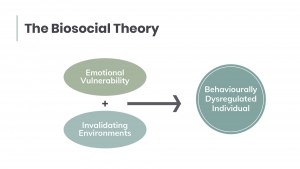Find Out About the Transformative Power of DBT London Therapy Procedure
Find Out About the Transformative Power of DBT London Therapy Procedure
Blog Article
Empowering Individuals Through Effective Dialectical Practices Therapy (DBT) Providers: Structure Stronger Mental Wellness Foundations
In the realm of psychological health and wellness and well-being, the relevance of empowering individuals via reliable Dialectical Behavior Treatment (DBT) solutions can not be overstated. By focusing on the core principles of DBT, such as improving psychological guideline abilities, improving interpersonal efficiency, developing distress tolerance methods, and growing mindfulness methods, individuals can begin on a journey towards structure more powerful mental wellness structures.
Understanding the Core Concepts of DBT


One core concept of DBT is validation. One more basic aspect is dialectics, which shows people to watch situations from several point of views and locate the synthesis in between conflicting thoughts or feelings.
Additionally, the principle of dialectical abstinence is main to DBT. This principle motivates people to stay away from self-destructive behaviors while additionally approving themselves. By recognizing and integrating these core principles, therapists can efficiently implement DBT techniques and support individuals in their journey in the direction of emotional policy and psychological health.
Enhancing Emotional Regulation Skills
Creating proficiency in handling feelings is a fundamental facet of promoting emotional well-being and social efficiency - DBT London. Enhancing emotional policy skills is a core component of Dialectical Behavior Therapy (DBT) that equips individuals with the devices to navigate intense feelings in a healthy and balanced and positive way. With DBT, people discover to recognize, comprehend, and control their emotions, bring about enhanced psychological health end results
DBT highlights the significance of mindfulness, which entails existing in the minute without judgment. This practice permits people to observe their emotions without ending up being bewildered by them, improving their capability to react efficiently instead of respond impulsively. By growing mindfulness, people can establish a greater feeling of self-awareness and emotional control.
Furthermore, DBT educates useful abilities such as distress tolerance and feeling law methods to help individuals manage challenging feelings. By finding out these abilities, people can lower spontaneous behavior, enhance decision-making, and strengthen their relationships with others. Eventually, improving psychological law skills with DBT encourages people to lead more meeting and well balanced lives.

Improving Interpersonal Effectiveness
Having actually established a strong foundation in psychological policy abilities within the framework of Dialectical Behavior Treatment (DBT), the focus currently shifts towards boosting interpersonal efficiency. Improving interpersonal effectiveness is a critical part of DBT as it outfits individuals with the required abilities to browse social interactions, communicate effectively, established borders, and build much healthier connections.
In DBT, interpersonal efficiency skills are educated via components that concentrate on areas such as assertiveness, effective interaction, and social analytic. By finding out these abilities, people can boost their capacity to share their needs and demands, keep self-respect, and construct more powerful links with others.
Exercising mindfulness is an important part of enhancing interpersonal effectiveness within the DBT structure. Mindfulness allows people to be existing in their interactions, pay attention actively, and respond thoughtfully as opposed to react impulsively. By including mindfulness into their daily lives, people can grow better self-awareness and emotional guideline, which are necessary for successful social communications.
Building Distress Resistance Methods
Checking out effective strategies for taking care of emotional distress is important for people seeking to enhance their coping skills and strength. Building distress tolerance strategies is a critical facet of Dialectical Behaviour Treatment (DBT) that empowers people to browse tough emotions without becoming overwhelmed - DBT London. One fundamental technique in DBT for distress resistance is the acronym "APPROVES," which means Tasks, Adding, Comparisons, Emotions, Pushing away, Thoughts, and Feelings. By using these methods, individuals can efficiently handle traumatic scenarios and control their psychological feedbacks.
Additionally, mindfulness techniques play a considerable function in structure distress tolerance. Mindfulness encourages people to stay present in the minute without judgment, allowing them to observe their ideas and feelings without responding impulsively. This awareness makes it possible for individuals to tolerate distress a lot more successfully and create a greater sense of control over their reactions.
In addition to these strategies, creating a personalized distress tolerance plan with the advice of a trained specialist can give people with a tailored approach to handling emotional distress - DBT London. By including these methods into day-to-day live, people can strengthen their mental wellness foundations and improve their overall well-being

Cultivating Mindfulness Practices
To deepen their distress resistance strategies better, individuals can concentrate on growing mindfulness methods as a corresponding method within the framework of Dialectical Behavior Therapy (DBT) Mindfulness, a vital component of DBT, involves taking notice of the present minute without judgment. By fostering mindfulness, see this site individuals can improve their recognition of ideas, feelings, and physical sensations, advertising a much deeper understanding of themselves and their experiences.
Mindfulness practices in DBT include methods such as conscious breathing, body scans, and observing ideas without add-on. These practices encourage people to establish a non-reactive position towards their internal experiences, allowing them to react to challenging scenarios with higher quality and calmness. By including mindfulness into day-to-day regimens, people can learn to regulate their feelings better, lower spontaneous behaviors, and grow a sense of inner tranquility.
With growing mindfulness methods, people going through DBT can construct a strong foundation for managing stress, improving relationships, and enhancing total health. By incorporating mindfulness right into their therapeutic journey, individuals can develop valuable abilities that encourage them to navigate life's challenges with resilience and self-awareness.
Conclusion
Finally, reliable Dialectical Behaviour Treatment (DBT) services play an important function in equipping people to construct more powerful mental wellness foundations. By understanding the core principles of DBT, boosting psychological regulation skills, boosting social efficiency, developing distress tolerance strategies, and growing mindfulness techniques, people are outfitted with the needed tools to browse their emotions, connections, and obstacles in a more adaptive and resistant manner. DBT services offer a comprehensive strategy to advertising mental well-being and encouraging people to lead satisfying lives.
By focusing on the core concepts of DBT, such as improving emotional guideline skills, improving social effectiveness, developing distress resistance strategies, and cultivating mindfulness practices, people can get started on a journey in the direction of building stronger psychological health structures. Enhancing emotional regulation abilities is a core element of Dialectical Behaviour Treatment (DBT) that gears up individuals with the devices to browse intense emotions in a healthy and balanced and positive manner.Moreover, DBT teaches practical skills such as distress resistance and emotion law strategies to help individuals manage tough emotions.To deepen their distress tolerance strategies better, people can focus on read what he said cultivating mindfulness practices as a complementary strategy within the structure of Dialectical Behaviour Therapy (DBT) By understanding the find this core concepts of DBT, boosting psychological policy skills, boosting social efficiency, building distress tolerance methods, and cultivating mindfulness methods, individuals are geared up with the required tools to browse their emotions, relationships, and obstacles in a much more resistant and flexible fashion.
Report this page